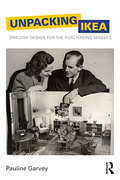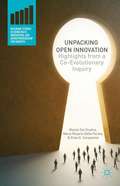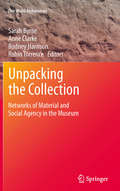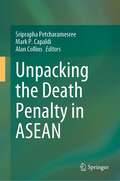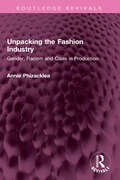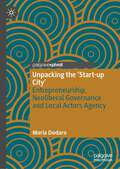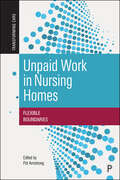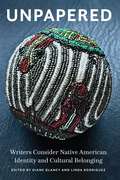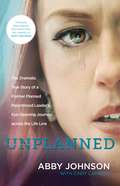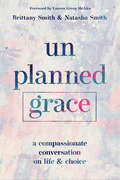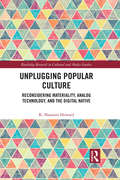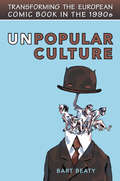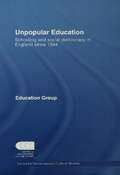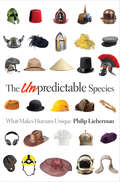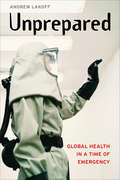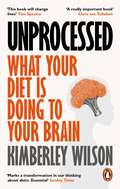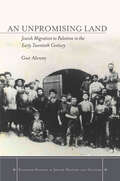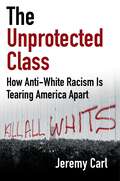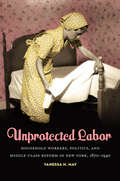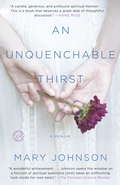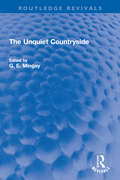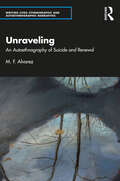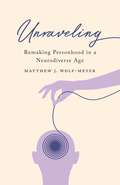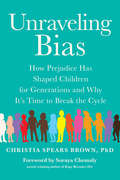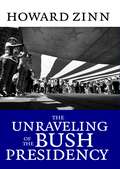- Table View
- List View
Unpacking IKEA: Swedish Design for the Purchasing Masses (CRESC)
by Pauline GarveyThis book represents the first anthropological ethnography of Ikea consumption and goes to the heart of understanding the unique and at times frantic popularity of this one iconic transnational store. Based on a year of participant observation in Stockholm’s Kungens Kurva store – the largest in the world - this book places the retailer squarely within the realm of the home-building efforts of individuals in Stockholm and to a lesser degree in Dublin. Ikea, the world’s largest retailer and one of its most interesting, is the focus of intense popular fascination internationally, yet is rarely subject to in-depth anthropological inquiry. In Unpacking Ikea, Garvey explores why Ikea is never ‘just a store’ for its customers, and questions why it is described in terms of a cultural package, as everyday and classless. Using in-depth interviews with householders over several years, this ethnographic study follows the furniture from the Ikea store outwards to probe what people actually take home with them.
Unpacking Open Innovation
by Elias G. Carayannis Manlio Del Giudice Maria Rosaria Della PerutaDisintegrated or distributed innovation, collaborative innovation, collective invention, collegial innovation, free innovation, open knowledge disclosure, free knowledge disclosure: are these all the same thing? This shows us there is some confusion regarding open innovation, or at least there is a need to cast a wider net around what open innovation is all about. The prevailing thought is that open innovation allows organizations to simultaneously expand their breadth of ideas, opportunities, and know-how while minimizing the technical and market risks associated with innovation. As a result, open innovation appears to come with little down side. Del Giudice, Della Peruta, and Carayannis fill the gap in our understanding of this emerging research field of open innovation. Their work depicts the major tendencies of publications through identifying the main themes in literature and investigating the research frontier. It also discusses potentially important fields of investigation that are still left rather unexplored.
Unpacking the Collection
by Rodney Harrison Anne Clarke Sarah Byrne Robin TorrenceMuseum collections are often perceived as static entities hidden away in storerooms or trapped behind glass cases. By focusing on the dynamic histories of museum collections, new research reveals their pivotal role in shaping a wide range of social relations. Over time and across space the interactions between these artefacts and the people and institutions who made, traded, collected, researched and exhibited them have generated complex networks of material and social agency. In this innovative volume, the contributors draw on a broad range of source materials to explore the cross-cultural interactions which have created museum collections. These case studies contribute significantly to the development of new theoretical frameworks to examine broader questions of materiality, agency, and identity in the past and present. Grounded in case studies from individual objects and museum collections from North America, Europe, Africa, the Pacific Islands, and Australia, this truly international volume juxtaposes historical, geographical, and cross-cultural studies. This work will be of great interest to archaeologists and anthropologists studying material culture, as well as researchers in museum studies and cultural heritage management.
Unpacking the Death Penalty in ASEAN
by Sriprapha Petcharamesree Mark P. Capaldi Alan CollinsThis book contributes conceptually, theoretically and morally to a deeper understanding of the distinctive Asian perceptions of punishment, justice and human rights. Researched and prepared by scholars who have not only been conducting studies on the death penalty in the region but have also been advocating for legal reforms, this edited book touches upon the different justifications for the use of capital punishment in the ASEAN region, exposing the secrecy, sensitivities and dilemmas that mask violations of international human rights laws. The chapters bring in numerous new perspectives which have been overlooked in the traditional discourse surrounding the use of the death penalty, such as that around crimes that do not meet the threshold of “most serious”; the dignity of death row inmates and their families; contradictions within religion and capital punishment; and the way in which growing authoritarianism and the media are adversely influencing the public’s perception and support for capital punishment in the region. In examining how public opinion shapes state policies towards the death penalty and how it varies according to different offences and different states, the authors critically analyse how the international human rights mechanisms have specifically called for ASEAN member states to refrain from extending the application of the death penalty and to limit it to the “most serious crimes.” Relevant to socio-legal scholars focused on crime and punishment in Southeast Asia, and in the Global South more broadly, this is a landmark collection in criminology and human rights scholarship. Chapter "ASEAN and the Death Penalty: Theoretical and Legal Views and a Pathway to Abolition" is available open access under a Creative Commons Attribution 4.0 International License via link.springer.com.
Unpacking the Fashion Industry: Gender, Racism and Class in Production (Routledge Revivals)
by Annie PhizackleaFirst Published in 1990 Unpacking the Fashion Industry spotlights a side of the industry the consumer never sees. What is the fashion clothing industry really like? What lies behind the glamour of the cat-walks and the glossy magazines? Annie Phizacklea focuses on the small firm sector of fashionwear production, based predominantly on ethnic entrepreneurship and cheap female labour and analyses the complex interaction of gender, class and racism in this sector of the industry. This book is a must read for scholars and researchers of sociology, gender studies and social anthropology.
Unpacking the ‘Start-up City’: Entrepreneurship, Neoliberal Governance and Local Actors Agency
by Maria DodaroThis book provides an invaluable overview of neoliberalising trends in urban policies and governance by presenting novel perspectives on municipal entrepreneurship support policies. It seeks to address a current lack of in-depth empirical knowledge of this topic and the reference literature’s silence on local actors agency. The book ’s scholarly debate around the impact of neoliberal capitalism on cities interweaves with empirical observations in the European cities of Barcelona and Milan with a view to examining what lies behind the “start-up city” label, and the way local actors reproduce, contest and re-signify entrepreneurship policies and practices in a highly individualised context. Based on more than sixty interviews with key policy actors, including young beneficiaries, it sheds light on their representations, motivations, intentions and room for manoeuvre in a way that encompasses local specificities in which multi-scalar economic, social, institutional and cultural processes interact. Finally, this book offers new insights into critical entrepreneurship studies and current debates about convergence and divergence trends in urban policies and governance.
Unpaid Work in Nursing Homes: Flexible Boundaries
by Pat ArmstrongEPDF and EPUB available Open Access under CC-BY-NC-ND licence. The COVID-19 pandemic has made unpaid care more visible through its absence, while also increasing the need for it. Drawing on a range of research projects covering Canada, Germany, Norway, Sweden, the UK and the US, this book documents a broad spectrum of unpaid work performed by residents, relatives, volunteers and staff in nursing homes. It demonstrates how boundaries between paid and unpaid work are flexible, varying considerably with conditions, time, place and intersectional populations. By examining the complex labour process within nursing homes, this book provides insight and understanding which will be critical in planning for nursing home care post-pandemic.
Unpapered: Writers Consider Native American Identity and Cultural Belonging
by Diane Glancy Linda RodriguezUnpapered is a collection of personal narratives by Indigenous writers exploring the meaning and limits of Native American identity beyond its legal margins. Native heritage is neither simple nor always clearly documented, and citizenship is a legal and political matter of sovereign nations determined by such criteria as blood quantum, tribal rolls, or community involvement. Those who claim a Native cultural identity often have family stories of tenuous ties dating back several generations. Given that tribal enrollment was part of a string of government programs and agreements calculated to quantify and dismiss Native populations, many writers who identify culturally and are recognized as Native Americans do not hold tribal citizenship. With essays by Trevino Brings Plenty, Deborah Miranda, Steve Russell, and Kimberly Wieser, among others, Unpapered charts how current exclusionary tactics began as a response to &“pretendians&”—non-indigenous people assuming a Native identity for job benefits—and have expanded to an intense patrolling of identity that divides Native communities and has resulted in attacks on peoples&’ professional, spiritual, emotional, and physical states. An essential addition to Native discourse, Unpapered shows how social and political ideologies have created barriers for Native people truthfully claiming identities while simultaneously upholding stereotypes.
Unplanned: The Dramatic True Story Of A Former Planned Parenthood Leader's Eye-opening Journey Across The Life Line
by Abby Johnson Cindy LambertAbby Johnson quit her job in October 2009. That simple act became a national news story because Abby was the director of a Planned Parenthood clinic in Texas who, after participating in an actual abortion procedure for the first time, walked down the street to join the Coalition for Life. <p><p>Unplanned is a heart-stopping personal drama of life-and-death encounters, a courtroom battle, and spiritual transformation that speaks hope and compassion into the political controversy that surrounds this issue. Telling Abby's story from both sides of the abortion clinic property line, this book is a must-read for anyone who cares about the life versus rights debate and helping women who face crisis pregnancies. Now updated with a new chapter covering the latest events in Abby's journey, in the news, and in changing legislation . . . and revealing the impact Abby's story has had in the most surprising places.
Unplanned Grace: A Compassionate Conversation on Life and Choice
by Brittany Smith Natasha SmithWhen a women receives an unexpected positive pregnancy test, abortion often seems like the best or only option for a fulfilling future. Unplanned Grace beautifully challenges that myth, equipping readers to support abortion-vulnerable women with love that values life in every way. Writing for the nonprofit organization Save the Storks, Natasha and Brittany draw on personal interviews, inspiring stories, and eye-opening facts to help readers understand: How economics, relationships, and health affect a woman's pregnancy decisionThe value of having empathy for women facing unplanned pregnanciesThe enormous potential churches have to support women in crisis Writing not just from a "pro-birth" perspective but from a "pro-abundant life" prospective, Unplanned Grace is an ideal resource for churches and individuals who want to make a difference in the pro-life movement.
Unplugging Popular Culture: Reconsidering Analog Technology, Materiality, and the “Digital Native" (Routledge Research in Cultural and Media Studies)
by K. Shannon HowardUnplugging Popular Culture showcases youth and young adult characters from film and television who defy the stereotype of the "digital native" who acts as an unquestioning devotee to screened technologies like the smartphone. In this study, unplugged tools, or non-digital tools, do not necessitate a ban on technology or a refusal to acknowledge its affordances but work instead to highlight the ability of fictional characters to move from high tech settings to low tech ones. By repurposing everyday materials, characters model the process of reusing and upcycling existing materials in innovative ways. In studying examples such as Pitch Perfect, Supernatural, Stranger Things, and Get Out, the book aims to make theories surrounding materiality apparent within popular culture and to help today’s readers reconsider stereotypes of the young people they encounter on a daily basis.
Unpopular Culture: Transforming the European Comic Book in the 1990s
by Bart BeatyIn the last fifteen years or so, a wide community of artists working in a variety of western European nations have overturned the dominant traditions of comic book publishing as it has existed since the end of the Second World War. These artists reject both the traditional form and content of comic books (hardcover, full-colour 'albums' of humour or adventure stories, generally geared towards children), seeking instead to instil the medium with experimental and avant-garde tendencies commonly associated with the visual arts. Unpopular Culture addresses the transformation of the status of the comic book in Europe since 1990. Increasingly, comic book artists seek to render a traditionally degraded aspect of popular culture un-popular, transforming it through the adoption of values borrowed from the field of 'high art.' The first English-language book to explore these issues, Unpopular Culture represents a challenge to received histories of art and popular culture that downplay significant historical anomalies in favour of more conventional narratives. In tracing the efforts of a large number of artists to disrupt the hegemony of high culture, Bart Beaty raises important questions about cultural value and its place as an important structuring element in contemporary social processes.
Unpopular Education: Schooling and Social Democracy in England since 1944
by CccsPublished in the year 2006, Unpopular Education is a valuable contribution to the field of Media and Cultural Studies.
The Unpredictable Species: What Makes Humans Unique
by Philip LiebermanHow our brains have evolved so that we control how we think and behaveThe Unpredictable Species argues that the human brain evolved in a way that enhances our cognitive flexibility and capacity for innovation and imitation. In doing so, the book challenges the central claim of evolutionary psychology that we are locked into predictable patterns of behavior that were fixed by genes, and refutes the claim that language is innate. Philip Lieberman builds his case with evidence from neuroscience, genetics, and physical anthropology, showing how our basal ganglia—structures deep within the brain whose origins predate the dinosaurs—came to play a key role in human creativity. He demonstrates how the transfer of information in these structures was enhanced by genetic mutation and evolution, giving rise to supercharged neural circuits linking activity in different parts of the brain. Human invention, expressed in different epochs and locales in the form of stone tools, digital computers, new art forms, complex civilizations—even the latest fashions—stems from these supercharged circuits.The Unpredictable Species boldly upends scientifically controversial yet popular beliefs about how our brains actually work. Along the way, this compelling book provides insights into a host of topics related to human cognition, including associative learning, epigenetics, the skills required to be a samurai, and the causes of cognitive confusion on Mount Everest and of Parkinson's disease.
Unprepared: Global Health in a Time of Emergency
by Andrew LakoffRecent years have witnessed an upsurge in global health emergencies—from SARS to pandemic influenza to Ebola to Zika. Each of these occurrences has sparked calls for improved health preparedness. In Unprepared, Andrew Lakoff follows the history of health preparedness from its beginnings in 1950s Cold War civil defense to the early twenty-first century, when international health authorities carved out a global space for governing potential outbreaks. Alert systems and trigger devices now link health authorities, government officials, and vaccine manufacturers, all of whom are concerned with the possibility of a global pandemic. Funds have been devoted to cutting-edge research on pathogenic organisms, and a system of post hoc diagnosis analyzes sites of failed preparedness to find new targets for improvement. Yet, despite all these developments, the project of global health security continues to be unsettled by the prospect of surprise.
Unprocessed: How the Food We Eat Is Fuelling Our Mental Health Crisis
by Kimberley WilsonWe all know that as a nation our mental health is in crisis. But what most don't know is that a critical ingredient in this debate, and a crucial part of the solution - what we eat - is being ignored.Nutrition has more influence on what we feel, who we become and how we behave than we could ever have imagined. It affects everything from our decision-making to aggression and violence. Yet mental health disorders are overwhelmingly treated as 'mind' problems as if the physical brain - and how we feed it - is irrelevant. Someone suffering from depression is more likely to be asked about their relationship with their mother than their relationship with food.In this eye-opening and impassioned book, psychologist Kimberley Wilson draws on startling new research - as well as her own work in prisons, schools and hospitals around the country - to reveal the role of food and nutrients in brain development and mental health: from how the food a woman eats during pregnancy influences the size of her baby's brain, and hunger makes you mean; to how nutrient deficiencies change your personality.We must also recognise poor nutrition as a social injustice, with the poorest and most vulnerable being systematically ignored. We need to talk about what our food is doing to our brains. And we need decisive action, not over rehearsed soundbites and empty promises, from those in power - because if we don't, things can only get worse.
An Unpromising Land: Jewish Migration to Palestine in the Early Twentieth Century
by Gur AlroeyThe Jewish migration at the end of the nineteenth and beginning of the twentieth centuries was one of the dramatic events that changed the Jewish people in modern times. Millions of Jews sought to escape the distressful conditions of their lives in Eastern Europe and find a better future for themselves and their families overseas. The vast majority of the Jewish migrants went to the United States, and others, in smaller numbers, reached Argentina, Canada, Australia, and South Africa. From the beginning of the twentieth century until the First World War, about 35,000 Jews reached Palestine. Because of this difference in scale and because of the place the land of Israel possesses in Jewish thought, historians and social scientists have tended to apply different criteria to immigration, stressing the uniqueness of Jewish immigration to Palestine and the importance of the Zionist ideology as a central factor in that immigration. This book questions this assumption, and presents a more complex picture both of the causes of immigration to Palestine and of the mass of immigrants who reached the port of Jaffa in the years 1904#150;1914.
The Unprotected Class: How Anti-White Racism Is Tearing America Apart
by Jeremy CarlAnti-white racism, undisguised and unembarrassed, is now official policy in America.One class of citizens—whites—is openly discriminated against in every sphere of public and private life. The Unprotected Class is a comprehensive explanation of how we got here and what we must do to correct a manifest—and dangerous—injustice. Launched with an appeal to justice for all, the civil rights movement went off the rails even as it achieved its original goals. Soon its excesses and failures were exploited to justify discrimination against whites in business, education, law, entertainment, and even the church. With the death of George Floyd and the shedding of all pretense of racial justice, vindictiveness, resentment, and hatred were unleashed in America.
Unprotected Labor: Household Workers, Politics, and Middle-class Reform in New York, 1870-1940
by Vanessa H. MayThrough an analysis of women's reform, domestic worker activism, and cultural values attached to public and private space, Vanessa May explains how and why domestic workers, the largest category of working women before 1940, were excluded from labor protections that formed the foundation of the welfare state. Looking at the debate over domestic service from both sides of the class divide, Unprotected Labor assesses middle-class women's reform programs as well as household workers' efforts to determine their own working conditions. May argues that working-class women sought to define the middle-class home as a workplace even as employers and reformers regarded the home as private space. The result was that labor reformers left domestic workers out of labor protections that covered other women workers in New York between the late nineteenth century and the New Deal. By recovering the history of domestic workers as activists in the debate over labor legislation, May challenges depictions of domestics as passive workers and reformers as selfless advocates of working women. Unprotected Labor illuminates how the domestic-service debate turned the middle-class home inside out, making private problems public and bringing concerns like labor conflict and government regulation into the middle-class home.
An Unquenchable Thirst: A Memoir
by Mary JohnsonAn unforgettable spiritual autobiography about a search for meaning that begins alongside one of the great religious icons of our time and ends with a return to the secular world At seventeen, Mary Johnson saw Mother Teresa's face on the cover of Time and experienced her calling. Eighteen months later, she entered a convent in the South Bronx to begin her religious training. Not without difficulty, this bright, independent-minded Texas teenager eventually adapted to the sisters' austere life of poverty and devotion, and in time became close to Mother Teresa herself. Still, beneath the white and blue sari beat the heart of an ordinary young woman facing the struggles we all share--the desire for love and connection, meaning and identity. During her twenty years with the Missionaries of Charity, Sister Donata, as she was known, grappled with her faith, her sexuality, the politics of the order, and her complicated relationship with Mother Teresa. Eventually, she left the church to find her own path--one that led to love and herself.Provocative, profound, and emotionally charged, An Unquenchable Thirst presents a rare, privileged view of Mother Teresa. At the same time, it is a unique and magnificent memoir of self-discovery.From the Hardcover edition.
The Unquiet Countryside (Routledge Revivals)
by G. E. MingayFirst published in 1989 The Unquiet Countryside chronicles rural crime and unrest in the English countryside from seventeenth century down to the end of the Victorian era. The authors highlight some of the most striking aspects of the countryside of the past: the extent and nature of rural crime and protest; riots over food; the Swing riots of 1830; poaching, arson, and animal maiming; the relations between landowners and the rural community; and the eventual new outlet for farmworkers in the growth of labour organizations. The volume expands our understanding of the rural past and directs new light on Britain’s rural heritage. This book is an essential read for scholars and researchers of British history, agricultural history, and history in general.
Unraveling: An Autoethnography of Suicide and Renewal (Writing Lives: Ethnographic and Autoethnographic Narratives)
by M. F. AlvarezUnraveling: An Autoethnography of Suicide and Renewal is an autoethnographic story that explores the intricate relationship among trauma, marginality, and mental health. It follows Mike Alvarez, a precocious gay teenager from an immigrant Filipino family, who loses his grip on reality as he succumbs to so-called mental illness. Divided into two parts, the first half of the book uses evocative storytelling and in-the-moment narration to capture the slow descent into anxiety, paranoia, depression, and suicidality, as experienced by the author during young adulthood. The second half of the book critically reflects upon the story through a series of analytic chapters. In these chapters, the author considers the role of narrative in cultivating empathy for the mentally ill, the psychiatric-industrial complex’s obstruction of that empathy, and the moral dilemmas autoethnographers face when writing about self, other, and the social world. This book will be suitable for scholars in the social sciences, communication studies, and healthcare, who study and use autoethnography in their research. It will also be of value to those interested in firsthand accounts of madness, as told by members of marginalized communities.
Unraveling: Remaking Personhood in a Neurodiverse Age
by Matthew J. Wolf-MeyerDeveloping a cybernetic model of subjectivity and personhood that honors disability experiences to reconceptualize the category of the human Twentieth-century neuroscience fixed the brain as the basis of consciousness, the self, identity, individuality, even life itself, obscuring the fundamental relationships between bodies and the worlds that they inhabit. In Unraveling, Matthew J. Wolf-Meyer draws on narratives of family and individual experiences with neurological disorders, paired with texts by neuroscientists and psychiatrists, to decenter the brain and expose the ableist biases in the dominant thinking about personhood. Unraveling articulates a novel cybernetic theory of subjectivity in which the nervous system is connected to the world it inhabits rather than being walled off inside the body, moving beyond neuroscientific, symbolic, and materialist approaches to the self to focus instead on such concepts as animation, modularity, and facilitation. It does so through close readings of memoirs by individuals who lost their hearing or developed trauma-induced aphasia, as well as family members of people diagnosed as autistic—texts that rethink modes of subjectivity through experiences with communication, caregiving, and the demands of everyday life. Arguing for a radical antinormative bioethics, Unraveling shifts the discourse on neurological disorders from such value-laden concepts as &“quality of life&” to develop an inclusive model of personhood that honors disability experiences and reconceptualizes the category of the human in all of its social, technological, and environmental contexts.
Unraveling Bias: How Prejudice Has Shaped Children for Generations and Why It's Time to Break the
by Christia Spears BrownWe need only scan the latest news headlines to see how bias and prejudice harm adults and children alike—every single day.Police shootings that give rise to the Black Lives Matter revolution . . . rampant sexual harassment of women and the subsequent #MeToo movement . . . extreme violence toward trans men and women.It would be easy to fix these problems if the examples stopped with a few racist or sexist individuals, but there are also biases embedded in our government policies, media, and institutions. As a developmental psychologist and international expert on stereotypes and discrimination in children, Dr. Christia Spears Brown knows that biases and prejudice don&’t just develop as people become adults (or CEOs or politicians). They begin when children are young, slowly growing and exposed to prejudice in their classrooms, after-school activities, and, yes, even in their homes, no matter how enlightened their parents may consider themselves to be. The only way to have a more just and equitable world—not to mention more broad-minded, empathetic children—is for parents to closely examine biases beginning in childhood and how they infiltrate our kids&’ lives.In her new book Unraveling Bias: How Prejudice Has Shaped Children for Generations and Why It's Time to Break the Cycle, Dr. Brown will uncover what scientists have learned about how children are impacted by biases, and how we adults can help protect them from those biases. Part science, part history, part current events, and part call to arms, Unraveling Bias provides readers with the answers to vital questions: • How do biased policies, schools, and media harm our children? • Where does childhood prejudice come from, and how do these prejudices shape children&’s behavior, goals, relationships, and beliefs about themselves? • What can we learn from modern-day science to help us protect our children from these biases?Few issues today are as critical as being aware of bias and prejudice all around us and making sure our kids don&’t succumb to them. To change lives and advance society, it&’s time to unravel our biases—starting with the future leaders of the world.
The Unraveling of the Bush Presidency
by Howard ZinnHere, in the magisterial yet plain-spoken style of A People's History of the United States, is historian Howard Zinn's long-awaited telling of these last six years of United States history, a time when catastrophic machinations of war have dictated our foreign and domestic policy, and when voices of resistance have appeared in the unlikeliest places.Perhaps more than any other American, Howard Zinn has helped us understand ourselves by deepening our understanding of our own history.
